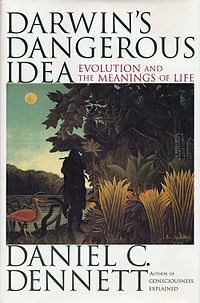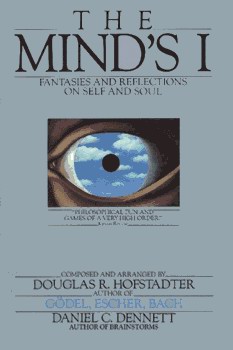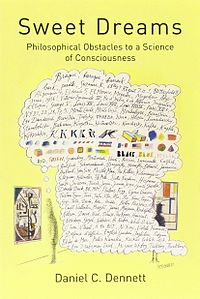The Chinese room argument holds that a digital computer executing a program cannot have a "mind", "understanding", or "consciousness", regardless of how intelligently or human-like the program may make the computer behave. Philosopher John Searle presented the argument in his paper "Minds, Brains, and Programs", published in Behavioral and Brain Sciences in 1980. Gottfried Leibniz (1714), Anatoly Dneprov (1961), Lawrence Davis (1974) and Ned Block (1978) presented similar arguments. Searle's version has been widely discussed in the years since. The centerpiece of Searle's argument is a thought experiment known as the Chinese room.

Daniel Clement Dennett III is an American philosopher, writer, and cognitive scientist whose research centers on the philosophy of mind, philosophy of science, and philosophy of biology, particularly as those fields relate to evolutionary biology and cognitive science.

Darwin's Dangerous Idea: Evolution and the Meanings of Life is a 1995 book by the philosopher Daniel Dennett, in which the author looks at some of the repercussions of Darwinian theory. The crux of the argument is that, whether or not Darwin's theories are overturned, there is no going back from the dangerous idea that design might not need a designer. Dennett makes this case on the basis that natural selection is a blind process, which is nevertheless sufficiently powerful to explain the evolution of life. Darwin's discovery was that the generation of life worked algorithmically, that processes behind it work in such a way that given these processes the results that they tend toward must be so.

The Origin of Consciousness in the Breakdown of the Bicameral Mind is a 1976 book by the Princeton psychologist, psychohistorian and consciousness theorist Julian Jaynes (1920-1997). It explores the nature of consciousness – particularly "the ability to introspect" – and its evolution in ancient human history. Jaynes proposes that consciousness is a learned behavior rooted in language and culture rather than being innate. He distinguishes consciousness from sensory awareness and cognition. Jaynes introduces the concept of the "bicameral mind", a non-conscious mentality prevalent in early humans that relied on auditory hallucinations.

Consciousness Explained is a 1991 book by the American philosopher Daniel Dennett, in which the author offers an account of how consciousness arises from interaction of physical and cognitive processes in the brain. Dennett describes consciousness as an account of the various calculations occurring in the brain at close to the same time. He compares consciousness to an academic paper that is being developed or edited in the hands of multiple people at one time, the "multiple drafts" theory of consciousness. In this analogy, "the paper" exists even though there is no single, unified paper. When people report on their inner experiences, Dennett considers their reports to be more like theorizing than like describing. These reports may be informative, he says, but a psychologist is not to take them at face value. Dennett describes several phenomena that show that perception is more limited and less reliable than we perceive it to be.
Greedy reductionism, identified by Daniel Dennett, in his 1995 book Darwin's Dangerous Idea, is a kind of erroneous reductionism. Whereas "good" reductionism means explaining a thing in terms of what it reduces to, greedy reductionism occurs when "in their eagerness for a bargain, in their zeal to explain too much too fast, scientists and philosophers ... underestimate the complexities, trying to skip whole layers or levels of theory in their rush to fasten everything securely and neatly to the foundation". Using the terminology of "cranes" and "skyhooks" built up earlier in the chapter, Dennett recapitulates his initial definition of the term in the chapter summary on p. 83: "Good reductionists suppose that all Design can be explained without skyhooks; greedy reductionists suppose it can all be explained without cranes."

The Mind's I: Fantasies and Reflections on Self and Soul is a 1981 collection of essays and other texts about the nature of the mind and the self, edited with commentary by philosophers Douglas R. Hofstadter and Daniel C. Dennett. The texts range from early philosophical and fictional musings on a subject that could seemingly only be examined in the realm of thought, to works from the twentieth century where the nature of the self became a viable topic for scientific study.
A philosophical zombie is a being in a thought experiment in philosophy of mind that is physically identical to a normal human being but does not have conscious experience.
Daniel Dennett's multiple drafts model of consciousness is a physicalist theory of consciousness based upon cognitivism, which views the mind in terms of information processing. The theory is described in depth in his book, Consciousness Explained, published in 1991. As the title states, the book proposes a high-level explanation of consciousness which is consistent with support for the possibility of strong AI.
The intentional stance is a term coined by philosopher Daniel Dennett for the level of abstraction in which we view the behavior of an entity in terms of mental properties. It is part of a theory of mental content proposed by Dennett, which provides the underpinnings of his later works on free will, consciousness, folk psychology, and evolution.
Here is how it works: first you decide to treat the object whose behavior is to be predicted as a rational agent; then you figure out what beliefs that agent ought to have, given its place in the world and its purpose. Then you figure out what desires it ought to have, on the same considerations, and finally you predict that this rational agent will act to further its goals in the light of its beliefs. A little practical reasoning from the chosen set of beliefs and desires will in most instances yield a decision about what the agent ought to do; that is what you predict the agent will do.

"Cartesian theater" is a derisive term coined by philosopher and cognitive scientist Daniel Dennett to refer pointedly to a defining aspect of what he calls Cartesian materialism, which he considers to be the often unacknowledged remnants of Cartesian dualism in modern materialist theories of the mind.

Victim of the Brain is a 1988 film by Dutch director Piet Hoenderdos, loosely based on The Mind's I (1981), a compilation of texts and stories on the philosophy of mind and self, co-edited by Douglas Hofstadter and Daniel C. Dennett. The film weaves interviews with Hofstadter with adaptations of several works in the book: Dennett's Where am I?, The Soul of the Mark III Beast by Terrel Miedaner, and also the short story The Seventh Sally: How Trurl's Own Perfection Led to No Good from The Cyberiad by Stanisław Lem. The film was shown several times on television in the Netherlands in the late 1980s.
Synthetic intelligence (SI) is an alternative/opposite term for artificial intelligence emphasizing that the intelligence of machines need not be an imitation or in any way artificial; it can be a genuine form of intelligence. John Haugeland proposes an analogy with simulated diamonds and synthetic diamonds—only the synthetic diamond is truly a diamond. Synthetic means that which is produced by synthesis, combining parts to form a whole; colloquially, a human-made version of that which has arisen naturally. A "synthetic intelligence" would therefore be or appear human-made, but not a simulation.
Richard Edward Dennett was an English trader operating out of the Kongo in the early 20th century who wrote a number of books that were influential on sociological and anthropological research on the cultures of West Africa.
An intuition pump is a type of thought experiment that leads the audience to a specific conclusion through intuition. Daniel Dennett, who coined the term, also called them "persuasion machines."

In philosophy of mind, Cartesian materialism is the idea that at some place in the brain, there is some set of information that directly corresponds to our conscious experience. Contrary to its name, Cartesian materialism is not a view that was held by or formulated by René Descartes, who subscribed rather to a form of substance dualism.

Sweet Dreams: Philosophical Obstacles to a Science of Consciousness is a 2005 book by the American philosopher Daniel Dennett, based on the text of the Jean Nicod lectures he gave in 2001.

In philosophy of mind, qualia are defined as instances of subjective, conscious experience. The term qualia derives from the Latin neuter plural form (qualia) of the Latin adjective quālis meaning "of what sort" or "of what kind" in relation to a specific instance, such as "what it is like to taste a specific apple — this particular apple now".

This is a list of the known kings of Loango.

From Bacteria to Bach and Back: The Evolution of Minds is a 2017 book about the origin of human consciousness by the philosopher Daniel Dennett, in which the author makes a case for a materialist theory of mind, arguing that consciousness is no more mysterious than gravity.











